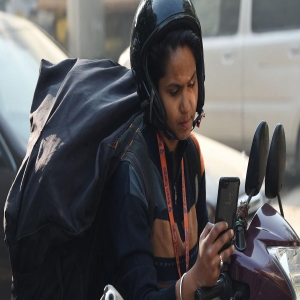
.png) Jaswant Kaur
Jaswant Kaur

A middle-aged woman living in a metro city juggles her daily chores early in the morning. Unlike others in the household, who are still fast asleep, she is awake at least two hours before anyone stirs. As she starts cooking in the kitchen, she gradually wakes the children, pushes them to bathe, and readies them for school. Running from one corner of the house to another, she grabs their bags and hurries to drop them at the bus stop.
As she returns home, her husband wakes up and asks for tea and the newspaper. Leisurely sipping his tea while reading, he seems oblivious to the hustle and bustle around him. Not that he is unemployed—he simply enjoys the privilege of starting his workday at 11 am. After a late-night grind with international clients, his role in a multinational company often keeps him up until 1 in the morning.
The woman, however, works for another company and must travel to the other side of the city, often switching between buses before finally arriving at her workplace. There, she encounters her poker-faced boss peering over his glasses as though catching her red-handed in some misdemeanour. Her office day is no less taxing—hopping from one meeting to another, struggling to take notes and meet deadlines, she leaves work around 8 pm, only to reach home by 10 pm, where the kitchen awaits her once again.
This scenario is far from unique—it mirrors the reality in countless urban households in India. Whether it's a delivery boy working for an e-commerce platform, a driver for an app-based service, a casual labourer, a shop owner, or a street vendor, everyone toils relentlessly to make ends meet. Yet, despite these gruelling efforts, earnings barely keep pace with rising expenses.
The decline is stark if we examine the year-on-year labour productivity growth rate (which measures hourly output based on human capital, physical investment, and technological advancement) over the last decade. From 4.23% in 2011, it peaked at 9.15% in 2016 but dropped sharply to 2.53% by 2023.
During the same period, the national floor-level minimum wage (NFLMW)— the baseline wage below which no state can set its minimum wage —grew from ?115 per day in 2012 to a mere ?178 in 2023. Is this even remotely sufficient to afford two square meals a day amid persistent inflation? Worse, the NFLMW has stagnated since 2019, when it first reached ?178.
A report by Fairwork India highlights how most gig platforms fail to provide fair wages, working conditions, or grievance redressal mechanisms. For example, a typical delivery worker earns less than ?25,000 a month despite working over 70 hours a week. This exploitative pattern reflects the broader startup work culture, where extended hours far exceed legal norms.
Recent controversies illustrate this toxic culture. A Reddit post alleging exploitative practices at Zepto, a quick-commerce startup, sparked widespread debate. The anonymous post accused the company of enforcing 14-hour shifts, scheduling meetings at odd hours to suit the CEO's late start, and favouring cost-cutting through junior hiring. These allegations struck a chord, resonating with grievances across sectors about overwork, toxic environments, and eroding work-life balance.
Zepto's CEO, Aadit Palicha, defended his company's practices with a sarcastic online statement. However, the backlash revealed deeper frustrations with startup environments that glorify "hustle culture." In such spaces, long hours are worn as a badge of honour, subtly implying that rest equates to laziness.
Social media amplifies this mindset. Platforms abound with stories of entrepreneurs romanticising sleepless nights, constant grind, and relentless hustle. The implication? That setting boundaries or taking breaks is tantamount to failure. Unfortunately, this narrative fuels an unhealthy normalisation of overwork, glorifying burnout rather than addressing it as a systemic issue.
This ethos is not confined to Zepto. In one tragic case, a 26-year-old Ernst & Young consultant and chartered accountant died allegedly due to work-related stress. None from her company attended her funeral, let alone offer condolences to her parents. Such incidents expose the cracks in a corporate culture that prioritises profit over employee well-being.
Adding to this mental health crisis are figures like Infosys founder NR Narayana Murthy, who advocate a 70-hour workweek in the name of "economic growth." He wants the nation to be "prosperous." Yet, data shows that longer hours do not correlate with productivity. Instead, they create a physically and mentally exhausted workforce incapable of leveraging technology effectively.
A study by the International Labour Organisation (ILO) found that 55% of Indian workers feel their jobs harm their mental health. Chronic stress from long hours and job insecurity also exacerbates public health challenges like hypertension, diabetes, and anxiety disorders.
Globally, the issue is recognised as severe. The World Health Organisation (WHO) has labelled workplace stress a "global epidemic," costing the global economy $1 trillion annually in lost productivity. A Deloitte survey revealed that 77% of professionals have experienced burnout at least once, with younger workers affected disproportionately.
India, however, lacks robust labour laws to protect employees from exploitative practices. While traditional workers may have some legal recourse, gig workers and startup employees often operate in legal grey zones, leaving millions vulnerable to unsafe working conditions and chronic underemployment.
It's worth examining global success stories. Countries like Sweden and Denmark have implemented six-hour workdays and mandatory vacation policies to improve productivity and employee satisfaction. Even Japan, once infamous for "karoshi" (death by overwork), has introduced initiatives like "Premium Friday," encouraging workers to leave early once a month.
India must learn from these examples. A healthier, balanced workforce is not just a moral imperative but an economic one. Chronic burnout diminishes innovation and productivity, eroding long-term national growth. Policymakers need to understand that "work hard, burn out, repeat" is a failed model.
The growing mental health crisis should be a turning point for reshaping India's work culture. The tragic death of the young Ernst & Young consultant should have spurred regulatory reform, including an effective grievance redressal mechanism to empower whistleblowers. But little has changed.
Ultimately, the future of work—and a truly Viksit Bharat—cannot be built on the backs of burnt-out employees. We need systemic reforms, institutional support, and a cultural shift toward valuing balance over burnout. Anything less would leave us chasing hollow economic growth while ignoring the people who sustain it.